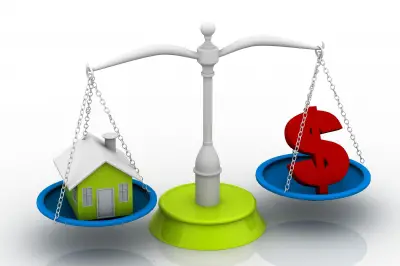Imagine the freedom you would feel having the monthly mortgage burden lifted off your shoulders. While paying this amount as a lump sum early in life is practically impossible, it is possible to reduce the payment term for a mortgage from 30 years to 15 years or even less. But of course the first step is to set it as a priority. Once you make becoming debt free a priority here are four actionable secrets on how you too can go about this.
Consider Bi-Weekly Payments
Obviously, one year only has twelve months, meaning that you make 12 monthly payments on your mortgage. The first step to reducing your mortgage is to convert to a “bi-weekly” mortgage payment. That means you make one “half-payment” every two weeks. So, for instance, if you pay $1,224 per month, you would pay $612 every two weeks. At first glance you might think how is that any different? But every year has 52 weeks which if you make a payment every other week, means you make 26 “half-payments” or 13 full payments rather than 12. Therefore, splitting your monthly mortgage loan installment and paying it every two weeks you add an extra month’s pay to your overall annual payment. Interestingly, you probably won’t even notice the difference in your disposable income.
In addition to making an extra payment every year, there is a slight mathematical advantage. Since you are paying half the payment 2 weeks early you owe less interest on that “half-payment” so you save a few dollars there as well. Those few dollars go toward reducing the principal each month. The compounding effect of those few dollars also knocks down the loan faster.
If you are paid bi-weekly this system is even better because you know exactly how much of your paycheck is going toward your mortgage. So rather than being able to spend a big portion of one paycheck and a small portion of the next one, you know that exactly $612 of every paycheck is going toward the mortgage. This makes budgeting the remainder much easier.
One caveat is to be sure that your mortgage company credits the payment correctly. Sometimes they try to allocate payments toward future interest rather than using it to reduce current principal.
Pay Extra Toward the Principal
Once you start seeing the principal falling and realize how good that feels, you might consider paying higher monthly installments than the amount stipulated in your mortgage contract. This additional amount need not be large to have a significant impact. You can start by simply rounding up your monthly payment. For instance, if you pay $1,224 per month, consider rounding this figure up to $1,300 or even to $1,250 or just $1,230. Somewhat surprisingly, even small amounts have a big impact early in the process and their impact decreases as time goes on. For a loan where you borrowed $228,000 for 30 years at 5% your monthly payment would be $1,223.95 (or say $1,224) On your first mortgage payment, out of that $1,224… $950 goes toward interest and only $273.95 (or $274) goes toward principal. So if you only added $27 to your principal payment you have increased it by 10%. On the other hand, after 20 years of normal loan payments you are still paying $1,23.95 a month but now (because the principal balance has fallen) $483.90 goes toward interest and $740.05 goes toward principal so an additional $27 only increases the principal payment by 5.5%. And unfortunately, after 20 years of payments your $228,000 loan still has a principal balance of $115,396.00. which is why reducing the principal as quicly as possible makes so much difference.
Once again, note that, for this seemingly insignificant amount to have an impact on your mortgage amount and repayment period, be sure to mark the extra payment as principal only.
Finance with Your Windfalls
Windfalls refer to the money that lands in your hands from unexpected sources. It may be a tax refund, annual bonuses, gifts or even winning a bet. If possible channel all these funds towards mortgage principal repayment. Just like the extra monthly payments, this lump sum payments help you cut the loan repayment period. They also help you save on total interest payable as these lump sums payments are going to reduce the principal.
Long vs. Short Term Mortgages
Pro homeowners replace their long-term mortgage with a shorter one, in some cases cutting it by half. For a 30-year mortgage, you can opt to refinance it with a 15-year plan. Note that this doesn’t double your monthly payments. Because the term is shorter it may only add a few hundred dollars a month to your payment. In the example above, financing a $228,000 loan at 5% for 15 years instead of 30 would increase your monthly payment from $1,223.95 to $1,803.01 an increase of $579.06.
This may be too much of an increase for your budget to handle but perhaps reducing the term to 20 or even 25 years might be doable. Or if you get a promotion or a raise rather than moving to a bigger house (and paying significant costs to a Real Estate agent and a moving company) you could just reduce the term of your mortgage instead.
You can always reduce your mortgage repayment period and even the amounts without breaking the bank. You only need to look at the different mortgage repayments tricks and work one that suits you best. Pro homeowners have been using such strategies to shorten their mortgage duration, so can you.
- Bi-Weekly Mortgage Calculator
- Accelerated Payment Mortgage calculator
- 3 Tips for Saving Money on Your First Mortgage
- Your Guide to Home Loan Refinancing
- Mortgage Jargon
- Financial Jargon – Investment Terminology for Beginners
- 5 Good Reasons To Get Title Insurance
- Rebuilding and Fixing Your Credit in 5 Steps
- Financial Figures: How to Budget for a Mortgage
- Home Buying 101: 4 Signs to Look for When Choosing a Mortgage Lender



A better strategy, if you have a 30 year fixed mortgage, is to pay it off at a 15 year mortgage monthly rate. There is no obligation to pay the 15 year payment. If you hit a bump in the road, you can revert back to your 30 year mortgage monthly payment. However, you should have a 6 to 12 month emergency fund set aside before you start paying off your mortgage with extra principle payments (and you should be credit card debt free).
So i owe 200k and i have been paying $200 more every month on the principal. Isnt what im doing similar vs making bi weekly payments?
Am i essentially paying off my mortgage faster?
Yes, it is similar and a decent strategy. But if you pay bi-weekly you are actually paying half of the month early so you reduce the interest a bit more. The bi-weekly also allows you to make the equivalent of 13 monthly payments every year and you probably won’t even notice the difference. What I like about the bi-weekly strategy is if you are paid bi-weekly you know exactly how much of your paycheck is going toward the mortgage because it is the same every paycheck. If your system works for you no worries.